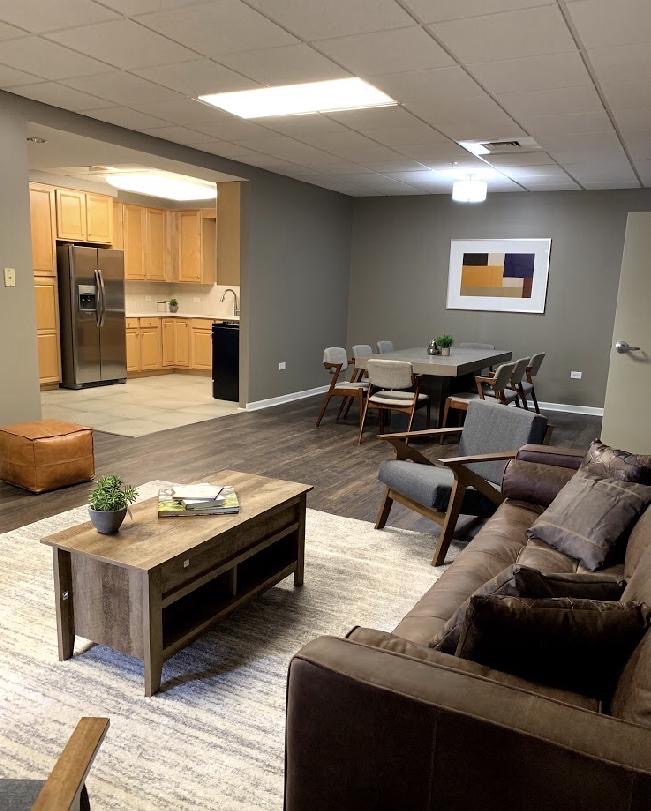Skip To Section:
Inpatient substance abuse treatment or residential rehabilitation is designed for people with severe addiction or addiction relapses, a mental health disorder, or co-occurring disorders. It combines medically supported programs with the therapy techniques that are most likely to result in long-term recovery maintenance.
When you enter inpatient treatment, you’ll live in a non-hospital, licensed residential facility, such as Footprints to Recovery, that provides safe housing and a medical care environment. This is a great option for those with more long-term needs requiring extra support throughout their recovery journey.

Getting Started with Residential Addiction Treatment
Individuals who have abused drugs or alcohol enter inpatient treatment under lots of different circumstances. Some common ones are:
- Following an emergency, like a car accident
- Following legal trouble related to your alcohol or drug abuse
- With a referral from a doctor
- Because you’re experiencing withdrawal symptoms after stopping drugs or alcohol
- Trying to cut back or quit but being unable to
Why Choose Residential Inpatient Treatment?
For many people, living in an inpatient treatment environment is essential to starting recovery. Why? Here are just a few of the benefits of choosing residential rehab:
- You can fully commit to sobriety without the distractions of everyday life.
- You are safe from your usual triggers.
- You prepare for a lifetime of sobriety by getting a roadmap.
When Should I Get Inpatient Treatment?
You should start residential treatment at a recovery center when you have finished medical detox. Sobriety can only happen when the body is free from drugs and alcohol. Medical detox is the process by which that happens. A medical detox facility aids in safe, comfortable, and effective detox with guidance from a team of medical professionals. That ensures the latest medical, holistic, and therapeutic approaches are used during detox.
The hardest part of sobriety might be learning to reorganize your life around anything other than alcohol and drugs. Going straight from detox to an inpatient rehab program can help.
When you first become sober, reentering your old life and community can be stressful. It is especially hard if you were dependent on drugs or alcohol for a long time. You will not just have to handle everyday stress. You may also feel extreme tension going back to work, explaining your absence to friends, or getting back into a routine at school. This shift can be even more challenging if you have a dual diagnosis. This means you struggle with a drug addiction issue as well as a mental disorder like depression or anxiety.
Residential treatment is usually recommended for individuals who struggle with the issues below:
- Serious addictions that an outpatient treatment center is unable to fully treat
- Co-occurring physical or mental health conditions
- An unstable or dangerous home setting
- Relapse
Residential therapy offers ‘round-the-clock care. You are more likely to keep your sobriety throughout this vulnerable period since there are few or no opportunities to relapse. Some types of outpatient care can provide a comparable degree of treatment intensity, but residential rehab is the greatest level of care due to its availability 24/7.

Residential Addiction Treatment at Footprints to Recovery
Staff members at Footprints include a range of specialists, including:
- Medical professionals and nurses
- Therapists
- Social workers
- Case managers
- Support personnel
Thanks to the diverse treatment programs and activities at Footprints to Recovery, your residential stay is a unique experience. Our medical staff will get to know you and what suits you best. Then you and your therapist will select the mode for your treatment plan.
Some of the most common elements of inpatient treatment include:
Individual Therapy
A key component of recovery is individual therapy. This is a process involving only two people: a client and an addiction treatment therapist. In their one-on-one sessions, the discussions focus on identifying and addressing your specific issues and needs. Individual therapy creates a safe place where you can feel comfortable to share past trauma or any other mental or behavioral health problems that often play roles in addiction.
Some components of individual therapy might include:
- Eye movement desensitization and reprocessing (EMDR) – EMDR is a form of cognitive behavioral therapy that can help individuals process traumatic memories. The goal of EMDR is to reduce the negative effect these memories have on your emotional responses.
- Cognitive behavioral therapy (CBT) – Through CBT, you learn how your thoughts, emotions, and actions are related. The goal is to have better control over your emotional states, thoughts, and actions.
- Acceptance and commitment therapy (ACT) – ACT is a form of CBT that helps you develop psychological flexibility so you are better able to take actions in line with their values and goals.
- Dialectical behavior therapy (DBT) – DBT combines individual counseling and group support with the goal of helping you learn to manage your emotions, develop healthier relationships, and increase self-acceptance.
Group Therapy
Although you will be apart from your family and friends while in residential rehab, you won’t ever feel lonely. Other community members who experience similar issues provide support and encouragement.
The advantages of community include these groups:
- Psychoeducational groups
- Experiential therapy
- Process groups
- Trauma groups
- 12-step groups
- Relapse-prevention-planning groups
Family Therapy
Having a support system in place can be helpful for recovery. That’s why family therapy is so important in addiction treatment. It’s an important step in building trust and communication between family members. It can show you that you have loved ones who care about and want to support you during your recovery journey. It can also help family members understand more about addiction and what they can do to stop enabling and get a loved one the help they need. Following treatment, an ability to rely on family for love, support, and relapse prevention can go a long way in your continued sobriety.
Holistic Recovery Services
Many think of recovery as being just a bunch of group meetings and counseling sessions. While individual and group therapy are very important, there are other health and wellness activities that go along with inpatient treatment that can help you develop healthy strategies for coping with the underlying causes of substance abuse.
Some of the most common holistic recovery services include:
- Acupuncture
- Exercise
- Massage therapy
- Yoga
- Chiropractic services
Footprints to Recovery encourages everyone to try holistic therapies during recovery. Many find that they mesh well with their new, sober lifestyle. These practices can even help with relapse prevention in the future because when you feel your mental health or substance abuse issues arising, using these coping mechanisms, activities, and techniques can help you maintain control over your thoughts, emotions, and behaviors. You don’t turn to drugs or alcohol to feel better because you already have the healthy tools you need.
Medication-Assisted Treatment (MAT)
For many patients, taking medication is a crucial element of getting better. Medication-assisted therapy reduces cravings and/or titrates down the number of drugs in your system. MAT is primarily used in detoxification settings. When you begin treatment, addiction treatment counselors outline a plan for your recovery based on factors like:
- The substance(s) you used
- The length of time you used
- Any mental health issues that are also present
They use this information to determine if MAT is right for you. Some people (such as those who have misused opioids) benefit from continuing use of drugs like methadone or buprenorphine as directed by a medical professional.
If you have a co-occurring mental health disorder, you might need drugs like antidepressants. You can get an assessment from an on-site physician’s assistant to see if you require medicine. We provide medication management during your time in residential rehab. It’s available whether you come to treatment with a prescription or start taking medication while you’re here.
Case Management
Part of effective inpatient treatment is having professional guidance and assistance throughout the process. Each client at Footprints to Recovery is assisted by a case manager who helps with all aspects of your aftercare. They can help with managing appointments outside of treatment like a doctor’s visit or physical therapy. Case managers also assist with scheduling outpatient services following inpatient treatment.
What Happens After Residential Rehab?
It can be hard to transition from a supportive, sober atmosphere to the “real world.” Because of this, many residential treatment centers, including Footprints to Recovery, include aftercare services.
In our aftercare program, your treatment team remains available to you in case you need additional support. You will also continue studying and using the techniques you picked up in therapy. Dealing with the temptations and difficulties in your life outside inpatient treatment is a crucial part of aftercare.
Recovery is a process. That means the further along you get on your journey, the more you may find you require a lower level of treatment than when you first began. After you finish inpatient treatment and as you take the next steps towards recovery, it’s common to assess factors like:
- How confident you feel in your recovery
- How serious your addiction issues were
- The system of support you have available
As you think about these things and talk with your care team, you may decide stepping down to an outpatient program is the right move. This is what many people do after inpatient rehab.
Outpatient treatment programs at Footprints to Recovery include:
- Partial hospitalization program (PHP) – Clients spend the day in group and individual therapy but return home each evening.
- Intensive outpatient program (IOP) – Clients spend a few hours a day, several days a week at the treatment facility participating in therapy sessions.
- Basic outpatient treatment – Clients participate in weekly individual counseling to help identify triggers and practice coping strategies.
Will Health Insurance Cover Inpatient Treatment?
Insurance does often cover part or all of treatment costs, but it’s important to verify your insurance beforehand. The team at Footprints to Recovery will look at your policy and offer guidance on which treatment options are available to pay for treatment. For those with insurance that doesn’t cover the entire cost of rehab, Footprints to Recovery offers flexible options for private pay in order to ensure cost is not a barrier to sobriety.

Inpatient Treatment at Footprints to Recovery
In a residential drug rehab program, you live in a treatment setting with round-the-clock care from specialists. Individual, group, and family therapy will help you learn how to stay sober and maintain your recovery. Footprints to Recovery offers a full range of therapeutic activities to strengthen your recovery. When you work with our professional medical team, you will be supported every step of the way toward healing.
The journey to recovery from drug or alcohol misuse doesn’t end when you get sober. It’s a lifelong path. When you partner with Footprints to Recovery, you give yourself the best chance for a lifetime of recovery. Contact us to learn more about how inpatient treatment could be the right first step for you.
Questions about treatment options?
Our admissions team is available 24/7 to listen to your story and help you get started with the next steps.

